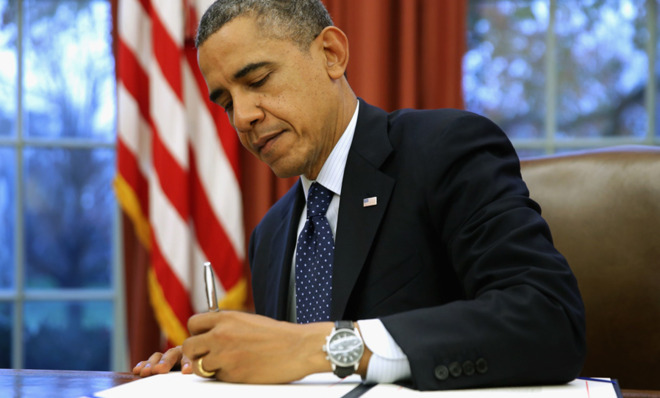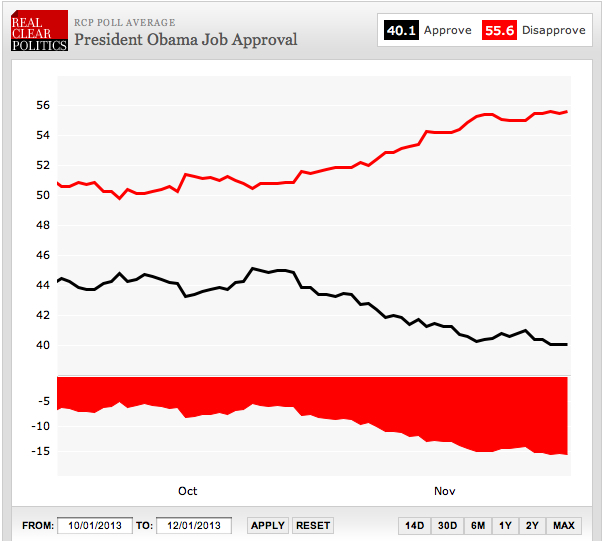Healthcare.gov, Obama's cratering popularity, and the Democrats' big 2014 problem
Before you declare the patches to the ObamaCare website a success, consider the administration's many other ailments


A free daily email with the biggest news stories of the day – and the best features from TheWeek.com
You are now subscribed
Your newsletter sign-up was successful
Upgrades, patches, and fixes. If only President Obama could do the kind of quick repair job to his flailing administration that has been done over the last few weeks to the markedly less wobbly Healthcare.gov.
Yes, the site is indeed less wobbly than it was a month ago. But don't be fooled: Healthcare.gov still has problems. Anyone who thinks Team Obama is breathing a sigh of relief, who thinks the administration is out of the woods, needs to know this: The administration has quietly canceled a big December ad campaign to encourage Americans to visit the site, out of fear that a new wave of visitors would cause it to crash. Not exactly a sign of confidence.
After weeks of round-the-clock triage, the site is better. It is "now stable and operating at its intended capacity, with greatly improved performance," says Jeffrey D. Zients, the web czar leading the repair effort. The New York Times said Sunday that "the administration gave itself a passing grade."
The Week
Escape your echo chamber. Get the facts behind the news, plus analysis from multiple perspectives.

Sign up for The Week's Free Newsletters
From our morning news briefing to a weekly Good News Newsletter, get the best of The Week delivered directly to your inbox.
From our morning news briefing to a weekly Good News Newsletter, get the best of The Week delivered directly to your inbox.
A passing grade? A "C" is a passing grade. No one is pretending here, certainly not the president and his advisers, that their efforts over the past few weeks to patch up the site deserves much more than that. But don't take my word for it. Since Oct. 1, when Healthcare.gov first went live, the president's job approval rating has sunk to 40.1 percent, the lowest of his entire presidency.

Real Clear Politics averages the numbers in eight leading surveys. It's hard for Obama supporters to deny the truth in these trend lines.
Obama's approval rating 58 months into his presidency is running even with Lyndon Johnson, who was done in by Vietnam, and George W. Bush, who was sinking under the weight of the bungled Iraq war and Hurricane Katrina. One saving grace for Obama: He's well ahead of Richard Nixon, who by this point in 1973 was sinking fast during Watergate. Of course, it's true that other two termers — Ronald Reagan and Bill Clinton — bounced back from second-term disasters (Iran-Contra and Monicagate). But Reagan and Clinton were teflon presidents; things didn't stick to them for long. Obama thinks he can recover like they did, but aside from being a good public speaker, I think it's fair to say at this point that he simply does not share their political gifts.
The comparisons with LBJ and George W. Bush (the latter particularly drives this White House crazy) mean little to the president, who claims to pay no attention to public opinion surveys. Obama remains contemptuous of the short-term focus; he is always said to be thinking long-term. He thinks that 10, 20 years from now, long after he has left the scene, universal health insurance will be something that all Americans not only appreciate, but take for granted, as citizens of every other industrialized western nation do. The way he sees it, the nasty, bitter fight we're having now will one day be little more than a historical footnote — sort of like how Americans today know nothing of the vitriol flung Franklin Roosevelt's way during the fight over Social Security.
A free daily email with the biggest news stories of the day – and the best features from TheWeek.com
He might be right. But the next election is one year away, not 10 or 20, and the current trend suggests trouble. The possibility of the Senate flipping to Republican control is growing, and dissatisfaction with ObamaCare — fueled by perceptions of incompetence and weakness — is cited, along with the less-than-robust economic recovery — as a big reason.
If you think Obama has trouble dealing with one GOP-controlled chamber of Congress, just imagine how miserable things will get for him if the Senate goes Republican, too. A GOP win in 2014 would end any question about whether the president is a lame duck. Immigration, energy, climate change, court appointees — little of anything of substance would get through. And just think: Harry Reid, after years of GOP obstructionism, just changed the rules to make it harder for Republicans to filibuster — a move that could come back to haunt him if, a year from now, he finds himself in the minority party.
The challenge for the president is about so much more than whether a website is running well. It's about positioning his party for the future. It's about rebutting fresh Republican claims that an activist government can't solve big social problems.
As he heads into his final three years in office, those are things that need upgrades, patches, and fixes.
An award-winning member of the White House press corps, Paul Brandus founded WestWingReports.com (@WestWingReport) and provides reports for media outlets around the United States and overseas. His career spans network television, Wall Street, and several years as a foreign correspondent based in Moscow, where he covered the collapse of the Soviet Union for NBC Radio and the award-winning business and economics program Marketplace. He has traveled to 53 countries on five continents and has reported from, among other places, Iraq, Chechnya, China, and Guantanamo Bay, Cuba.
-
 Tourangelle-style pork with prunes recipe
Tourangelle-style pork with prunes recipeThe Week Recommends This traditional, rustic dish is a French classic
-
 The Epstein files: glimpses of a deeply disturbing world
The Epstein files: glimpses of a deeply disturbing worldIn the Spotlight Trove of released documents paint a picture of depravity and privilege in which men hold the cards, and women are powerless or peripheral
-
 Jeff Bezos: cutting the legs off The Washington Post
Jeff Bezos: cutting the legs off The Washington PostIn the Spotlight A stalwart of American journalism is a shadow of itself after swingeing cuts by its billionaire owner
-
 The billionaires’ wealth tax: a catastrophe for California?
The billionaires’ wealth tax: a catastrophe for California?Talking Point Peter Thiel and Larry Page preparing to change state residency
-
 Bari Weiss’ ‘60 Minutes’ scandal is about more than one report
Bari Weiss’ ‘60 Minutes’ scandal is about more than one reportIN THE SPOTLIGHT By blocking an approved segment on a controversial prison holding US deportees in El Salvador, the editor-in-chief of CBS News has become the main story
-
 Has Zohran Mamdani shown the Democrats how to win again?
Has Zohran Mamdani shown the Democrats how to win again?Today’s Big Question New York City mayoral election touted as victory for left-wing populists but moderate centrist wins elsewhere present more complex path for Democratic Party
-
 Millions turn out for anti-Trump ‘No Kings’ rallies
Millions turn out for anti-Trump ‘No Kings’ ralliesSpeed Read An estimated 7 million people participated, 2 million more than at the first ‘No Kings’ protest in June
-
 Ghislaine Maxwell: angling for a Trump pardon
Ghislaine Maxwell: angling for a Trump pardonTalking Point Convicted sex trafficker's testimony could shed new light on president's links to Jeffrey Epstein
-
 The last words and final moments of 40 presidents
The last words and final moments of 40 presidentsThe Explainer Some are eloquent quotes worthy of the holders of the highest office in the nation, and others... aren't
-
 The JFK files: the truth at last?
The JFK files: the truth at last?In The Spotlight More than 64,000 previously classified documents relating the 1963 assassination of John F. Kennedy have been released by the Trump administration
-
 'Seriously, not literally': how should the world take Donald Trump?
'Seriously, not literally': how should the world take Donald Trump?Today's big question White House rhetoric and reality look likely to become increasingly blurred
